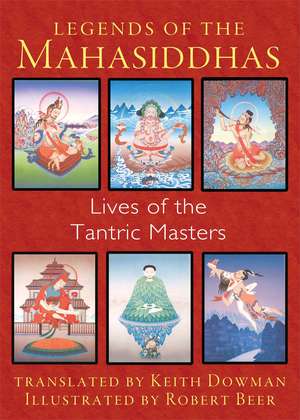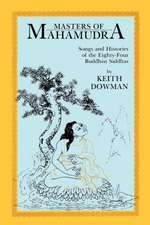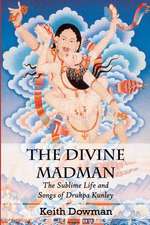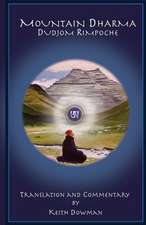Legends of the Mahasiddhas: Lives of the Tantric Masters
Traducere de Keith Dowman Ilustrat de Robert Beeren Limba Engleză Paperback – 9 oct 2014
Recounting the magical and "crazy" deeds of the mahasiddhas, such as walking through walls, flying, talking with birds, and turning people to stone, Dowman reveals the human qualities of the tantric masters and the vital elements of the siddhas' philosophy of nonduality and emptiness. Richly illustrated with paintings of the tantric saints by artist Robert Beer, these stories of the mahasiddhas show us a way through human suffering into a spontaneous and free state of oneness with the divine.
Preț: 101.12 lei
Preț vechi: 131.79 lei
-23% Nou
Puncte Express: 152
Preț estimativ în valută:
19.35€ • 20.20$ • 16.01£
19.35€ • 20.20$ • 16.01£
Carte disponibilă
Livrare economică 14-26 martie
Preluare comenzi: 021 569.72.76
Specificații
ISBN-13: 9781620553657
ISBN-10: 1620553651
Pagini: 256
Ilustrații: Includes 30 color plates and 26 b&w illustrations
Dimensiuni: 178 x 254 x 18 mm
Greutate: 0.64 kg
Ediția:3rd Edition, New Edition of Buddhist Masters of Enchantment
Editura: Inner Traditions/Bear & Company
Colecția Inner Traditions
ISBN-10: 1620553651
Pagini: 256
Ilustrații: Includes 30 color plates and 26 b&w illustrations
Dimensiuni: 178 x 254 x 18 mm
Greutate: 0.64 kg
Ediția:3rd Edition, New Edition of Buddhist Masters of Enchantment
Editura: Inner Traditions/Bear & Company
Colecția Inner Traditions
Notă biografică
Keith Dowman is a longtime initiate of Dzogchen and a teacher of radical Dzogchen around the world. He is the author of several Dzogchen translations, most recently Natural Perfection and Dzogchen. He lives in Kathmandu. Robert Beer began studying and practicing Tibetan thangka painting in 1970 while living in India and Nepal and still continues this research from his home in Oxford. He is the author and illustrator of The Encyclopedia of Tibetan Symbols and Motifs and The Handbook of Tibetan Buddhist Symbols.
Extras
THAGANAPA
Master of the Lie
To release water in the ear,
Inject water into the ear.
To see truth,
Contemplate all phenomena as a lie.
Thaganapa was born into a low-caste family in eastern India. Early on, he showed criminal tendencies, and in time his entire life and livelihood came to depend upon exploitation and deception.
One day, he was sitting on a log at the edge of a town plotting a beautiful con job, when a wise monk chanced to pass by.
“Why are you so deep in thought, my friend?” asked the monk. “It’s a long story, venerable sir,” Thaganapa began.
But the monk interrupted. “You’re about to tell me a lie, aren’t you? Haven’t you learned that the more you lie, the more you believe lying is normal, and the more your habit of lying will be strengthened. If you continue on this way, when your karma matures, you will be reborn in hell.
Thaganapa turned pale and began to tremble.
“Lying has physical effects as well, you know,” the monk went on. “Your tongue gets furrowed, your breath stinks, and your speech becomes ineffectual and unconvincing. A liar’s karma makes all fields infertile and the seeds you sow dry and impotent.”
Thaganapa had not heard the doctrine of karma applied to lying before, and the monk’s apt analysis hit home. “You’ve seen right through me,” he admitted. “They call me Thaganapa because I cannot speak so much as a hundredth part of a hairsbreadth of truth. I lie to everybody--no exception. But what can I do about it?”
“Do you think you’re capable of practicing a sadhana?” asked the monk.
“Well, I suppose I could try,” said Thaganapa doubtfully. “But I’ve been lying for so long I don’t know if I can stop.”
“You’re not the only liar since time began,” said the monk kindly. “There are precepts even for those such as you.”
“All right then,” said Thaganapa, relieved. “Go ahead.”
The monk began to give Thaganapa instruction in the yoga called “removing water in the ear by means of water”--a meditation that uses deception as an antidote to deception. Next, he gave him the initiation that matures the immature mindstream. And then the monk taught him these precepts: “All that you see, hear, touch, think you perceive with the six senses, indeed, all that you experience, is nothing but a lie.”
Ignorant that all phenomena is a lie,
You say you are a liar.
But if knowledge and the knower,
The six senses and all that is sensed,
Are lies, then what is truth?
Childish ignorance of the universal lie
Holds falseness to be true.
When we tell ourselves that deception is truth
We bind ourselves to the round of existence
Like the liquid drops on the rim of a water wheel.
Therefore contemplate
All experience as inherently deceptive,
All form as inherently deceptive,
All sound as inherently deceptive.
In time, you will discover
That even your belief in deception is a lie.
For seven years Thaganapa meditated upon all perceptual knowledge as deception. At the conclusion of his sadhana, he gained the understanding that all experience of the phenomenal world is a fiction.
Gaining perfect detachment, he came to see all phenomena as dream, hallucination, castles in the air, reflections of the moon in water, images in a mirror. And with his detachment he acquired the qualities of clarity, control, and equanimity. Thinking that he had gained the ultimate goal, he sought out his guru for confirmation.
The monk said simply, “Experience is neither deception nor truth. Reality is uncreated, indeterminate. Now you must meditate upon your experience of all things as emptiness rendered empty by its very nature.”
Thaganapa obeyed his guru and returned to his practice. His path was one of resolving paradox, of weaving conflicting thoughts and feelings together into a tapestry of the inherent emptiness of all things.
Gaining siddhi, he was known to all as “Master of the Lie,” and he taught those with good karma how to “release water in the ear by means of water.” After many years of selfless service, he was assumed into the Paradise of the Dakinis.
Master of the Lie
To release water in the ear,
Inject water into the ear.
To see truth,
Contemplate all phenomena as a lie.
Thaganapa was born into a low-caste family in eastern India. Early on, he showed criminal tendencies, and in time his entire life and livelihood came to depend upon exploitation and deception.
One day, he was sitting on a log at the edge of a town plotting a beautiful con job, when a wise monk chanced to pass by.
“Why are you so deep in thought, my friend?” asked the monk. “It’s a long story, venerable sir,” Thaganapa began.
But the monk interrupted. “You’re about to tell me a lie, aren’t you? Haven’t you learned that the more you lie, the more you believe lying is normal, and the more your habit of lying will be strengthened. If you continue on this way, when your karma matures, you will be reborn in hell.
Thaganapa turned pale and began to tremble.
“Lying has physical effects as well, you know,” the monk went on. “Your tongue gets furrowed, your breath stinks, and your speech becomes ineffectual and unconvincing. A liar’s karma makes all fields infertile and the seeds you sow dry and impotent.”
Thaganapa had not heard the doctrine of karma applied to lying before, and the monk’s apt analysis hit home. “You’ve seen right through me,” he admitted. “They call me Thaganapa because I cannot speak so much as a hundredth part of a hairsbreadth of truth. I lie to everybody--no exception. But what can I do about it?”
“Do you think you’re capable of practicing a sadhana?” asked the monk.
“Well, I suppose I could try,” said Thaganapa doubtfully. “But I’ve been lying for so long I don’t know if I can stop.”
“You’re not the only liar since time began,” said the monk kindly. “There are precepts even for those such as you.”
“All right then,” said Thaganapa, relieved. “Go ahead.”
The monk began to give Thaganapa instruction in the yoga called “removing water in the ear by means of water”--a meditation that uses deception as an antidote to deception. Next, he gave him the initiation that matures the immature mindstream. And then the monk taught him these precepts: “All that you see, hear, touch, think you perceive with the six senses, indeed, all that you experience, is nothing but a lie.”
Ignorant that all phenomena is a lie,
You say you are a liar.
But if knowledge and the knower,
The six senses and all that is sensed,
Are lies, then what is truth?
Childish ignorance of the universal lie
Holds falseness to be true.
When we tell ourselves that deception is truth
We bind ourselves to the round of existence
Like the liquid drops on the rim of a water wheel.
Therefore contemplate
All experience as inherently deceptive,
All form as inherently deceptive,
All sound as inherently deceptive.
In time, you will discover
That even your belief in deception is a lie.
For seven years Thaganapa meditated upon all perceptual knowledge as deception. At the conclusion of his sadhana, he gained the understanding that all experience of the phenomenal world is a fiction.
Gaining perfect detachment, he came to see all phenomena as dream, hallucination, castles in the air, reflections of the moon in water, images in a mirror. And with his detachment he acquired the qualities of clarity, control, and equanimity. Thinking that he had gained the ultimate goal, he sought out his guru for confirmation.
The monk said simply, “Experience is neither deception nor truth. Reality is uncreated, indeterminate. Now you must meditate upon your experience of all things as emptiness rendered empty by its very nature.”
Thaganapa obeyed his guru and returned to his practice. His path was one of resolving paradox, of weaving conflicting thoughts and feelings together into a tapestry of the inherent emptiness of all things.
Gaining siddhi, he was known to all as “Master of the Lie,” and he taught those with good karma how to “release water in the ear by means of water.” After many years of selfless service, he was assumed into the Paradise of the Dakinis.
Cuprins
Autobiographical Note by the Illustrator
Introduction
The Mahasiddhas
Minapa, The Bengali Jonah
Luipa, The Fish-Gut Eater
Virupa, Master of Dakinis
Dombipa, The Tiger Rider
Saraha, The Great Brahmin
Lilapa, The Royal Hedonist
Savaripa, The Hunter
Goraksa, The Immortal Cowherd
Tantipa, The Senile Weaver
Khadgapa, The Master Thief
Caurangipa, The Limbless One
Kankaripa, The Lovelorn Widower
Aryadeva, The Lotus-Born
Nagarjuna, Philosopher and Alchemist
Vinapa, The Music Lover
Thaganapa, Master of the Lie
Camaripa, The Divine Cobbler
Syalipa, The Jackal Yogin
Naropa, The Dauntless Disciple
Tilopa, The Great Renunciate
Santipa, The Academic
Mekopa, The Wild-Eyed Guru
Kambala, The Yogin of the Black Blanket
Vyalipa, The Courtesan’s Alchemist
Tantepa, The Gambler
Kukkuripa, The Dog Lover
Kanhapa, The Dark-Skinned One
Acinta, The Avaricious Hermit
Bhadrapa, The Snob
Kalapa, The Handsome Madman
Bhusuku (Santideva), The Lazy Monk
Kotalipa, The Peasant Guru
Indrabhuti, The Enlightened King
Jalandhara, The Chosen One
Bhiksanapa, Siddha Two-Teeth
Ghantapa, The Celibate Monk
Campaka, The Flower King
Kumbharipa, The Potter
Godhuripa, The Bird Catcher
Vinapa, The Music Lover
Thaganapa, Master of the Lie
Camaripa, The Divine Cobbler
Syalipa, The Jackal Yogin
Naropa, The Dauntless Disciple
Tilopa, The Great Renunciate
Santipa, The Academic
Mekopa, The Wild-Eyed Guru
Kambala, The Yogin of the Black Blanket
Vyalipa, The Courtesan’s Alchemist
Tantepa, The Gambler
Kukkuripa, The Dog Lover
Kanhapa, The Dark-Skinned One
Acinta, The Avaricious Hermit
Bhadrapa, The Snob
Kalapa, The Handsome Madman
Bhusuku (Santideva), The Lazy Monk
Kotalipa, The Peasant Guru
Indrabhuti, The Enlightened King
Jalandhara, The Chosen One
Bhiksanapa, Siddha Two-Teeth
Ghantapa, The Celibate Monk
Campaka, The Flower King
Kumbharipa, The Potter
Godhuripa, The Bird Catcher
Kapalapa, The Skull Bearer
Carbaripa (Carpati), The Siddha Who Turned People to Stone
Kantalipa, The Rag Picker
Jayananda, The Crow Master
Dhilipa, The Epicure
Darikapa, Slave-King of the Temple Whore
Udhilipa, The Flying Siddha
Laksminkara, The Mad Princess
Nirgunapa, The Enlightened Moron
Mekhala and Kanakhala, The Headless Sisters
Kirapalapa (Kilapa), The Repentant Conqueror
Nagabodhi, The Red-Horned Thief
Sarvabhaksa, The Empty-Bellied Siddha
Manibhadra, The Model Wife
Saroruha, The Lotus Child
Publisher’s Note
Recenzii
“Robert Beer is a master. His own story of being rescued by Tibetan art is almost as amazing as the stories of the Mahasiddhas.”
“A powerful enticement to Eastern thought.”
"These are extraordinary, riveting tales. . . a book of high merit and high adventure, a marvel of inspired creation. . . stories through whose cosmic transparency shines the illimitable Buddha-nature."
“A powerful enticement to Eastern thought.”
"These are extraordinary, riveting tales. . . a book of high merit and high adventure, a marvel of inspired creation. . . stories through whose cosmic transparency shines the illimitable Buddha-nature."
Descriere
A richly illustrated collection of stories about the mahasiddhas, spiritual adventurers who attained enlightenment by disregarding convention














